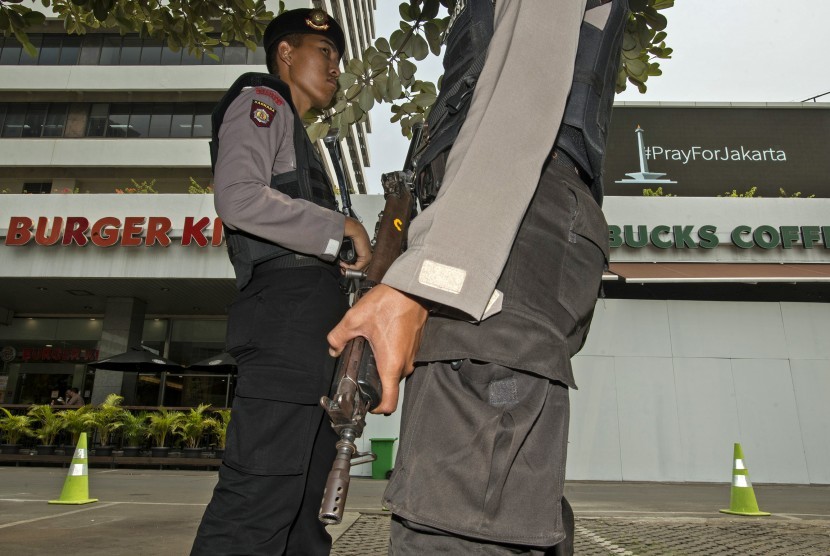REPUBLIKA.CO.ID, By: Otjih Sewandarijatun *)
A large portion of the money used by terror groups in Indonesia comes from overseas. The Financial Transaction Reports and Analysis Center (PPATK) deputy chairman Agus Santoso said the center had detected a large amount of money sent by entities in several countries abroad, including Australia and Middle Eastern countries, to fund terrorism in Indonesia.
They transferred the money. They had many ways of sending the funds, for example, through our migrant workers in Malaysia, Singapore and Middle Eastern countries. The money can be directed to Indonesia through various countries such as Australia, Hong Kong, Malaysia, Singapore and many more.
PPATK will provide information on networks with suspicious transactions. If a law enforcement process stands alone, it won’t be successful because terrorists will neither confess to nor open their links. They might claim that they work alone, but, from their transactions, we can give evidence that they are not working alone.
The PPATK adhered to international fund transfer instructions in which every single rupiah, or a single dollar’s worth of transaction, must be reported to the center. PPATK also have cross border cash carrying procedures. Those who bring cash money across borders must be asked to reveal the source of their money. PPATK was currently mapping out the sources of finance for terror groups in Indonesia and their membership in any terrorist-related organization.
Indonesia is facing tough challenges countering terrorism as financial support for terrorist groups has been getting stronger of late. Indonesia must cooperate closely with countries in the region to prevent widespread terrorism. The terrorists had many ways of financing their activities. They can get funds in many ways, mixing illegal money with legal money.
Financing for terrorism came not only from small businesses but also from larger companies. The companies operate in various fields such as textile manufacturing, construction and many more. It is obvious the world’s terrorist networks have been supported with big capital.
The educational background of terrorists also influenced their method of building up their financial sources. Robbery may be committed by terrorists who graduated only from elementary school, while terrorists with hacking skills may have a diploma. For those who have a company, it is probable they have a higher educational background.
Meanwhile, a professor on international terrorism from Nanyang Technological University in Singapore, Rohan Gunaratna, said monitoring terrorists’ financial activities was the key to a successful fight against terrorism. Finance intelligence is a very powerful tool in the fight against terrorism because money is the life blood of terrorists.
Citing an example, a terrorist leader was found to have sent 22 payments totaling Rp 1.8 billion (US$ 137,247.48) from Turkey through Western Union to Indonesia. For the Thamrin attacks in January this year, at least Rp 70 million had also been sent from Turkey to Indonesia.
A Terrorism was a regional challenge because Indonesia and other countries in the region, such as Malaysia, Singapore and the Philippines, were currently struggling to combat terror threats. Now, Indonesia is leading the way in building a regional framework in the fight against terrorism. Indonesia's initiative to work with other countries in the region to fight terrorism.
Traditionally, historically, the fight against terrorism has only been between government agencies. But for the first time, PPATK has invited industries, such as banks, financial institutions, even private sector partners and academics, to join the effort.
Fighting against terrorism cannot be done by one country alone. We have to work together with other countries in the region. Thus, Indonesia is taking the initiative to build regional risk assessment with six other countries that border Indonesia, such as Australia, Malaysia, Singapore, Thailand and the Philippines.
Terrorist threats is a global threats which could be broken humankind value, so that a spirit of togetherness to fight against terrorist must be built as a spirit of global ones. As an organization, a terror organization should be needed money for an everlasting their group’s, because money is the life blood of terrorist including the militance spirit and the fighting spirit.
To facing and to reducing a terror threats, every country should be made firmly cooperation international network to handle a terrorist cross-border movement including actor, information and also fund flow. Recently, a terrorist threats might be completed with a new phenomenon such as Foreign Terrorist Fighters who is a foreign terrorist fighters and technology information abuse to spreading radical and extrem teachings.
Previously, a terrorism problem could be got a huge attention from an international communities including Indonesia. A terrorism threats gave a serious threats for peace and international security including social economic development. A terrorism is an extra ordinary crimes which could be big loss and its makes a lot of victims and every country has a same problems link with terrorist.
Cutting a sources of terrorist’s fund as a strategic policy must be done. To realizing those ones, the mapping of a current terrorist group location, an international terrorist linkages, the list of allegedly suspect actor, companies, migrant workers who links with a terror group and an international cooperation among finance intelligence unit should be done.
Last but not least, an Indonesia finance intelligence unit such as PPATK should be made a strong cooperation and coordination with banking sector, business association and migrant workers companies to tracking and to cutting a sources of a terror fund which migh be came from those sector.
*) The author graduated from Udayana University, Bali. Former Director of Mass Communication in Lembaga Analisa Politik dan Demokrasi, Jakarta.



